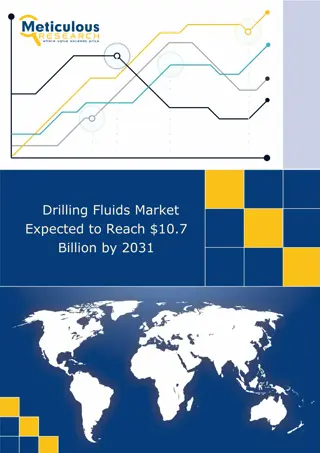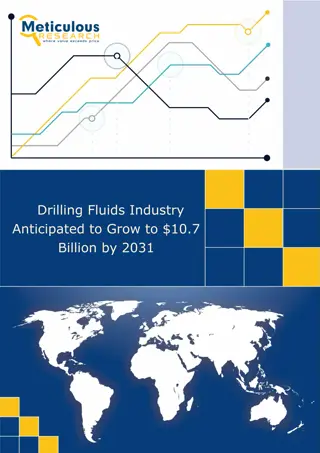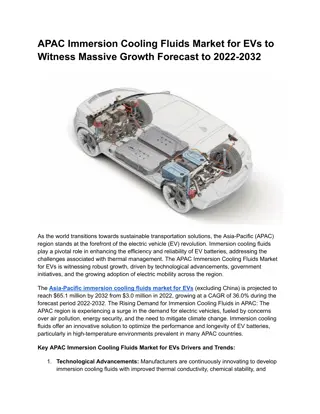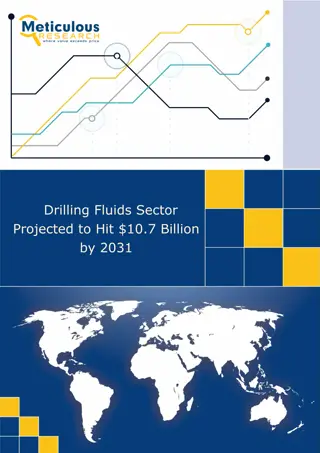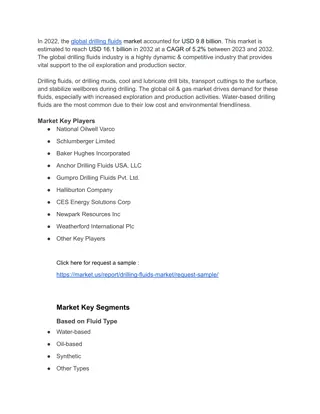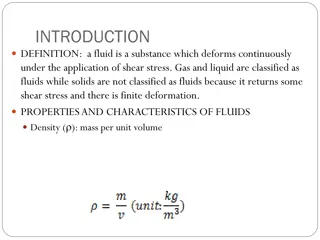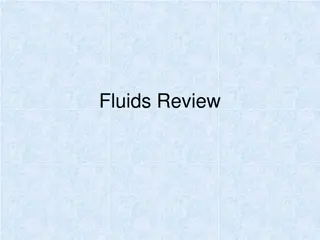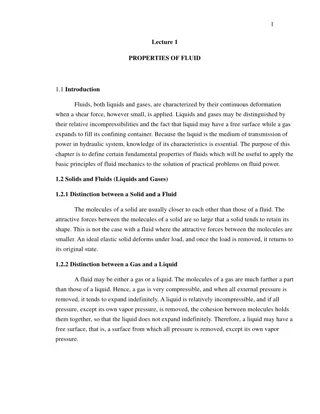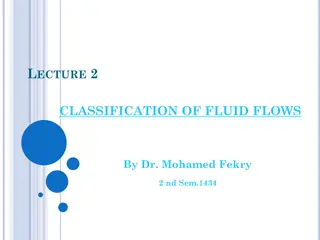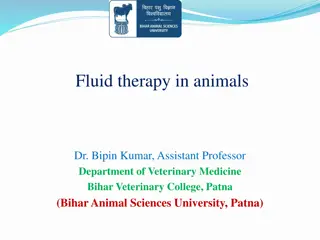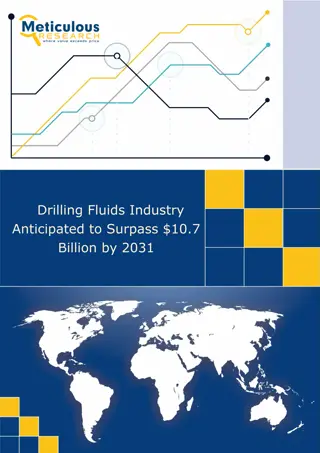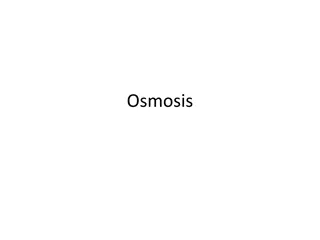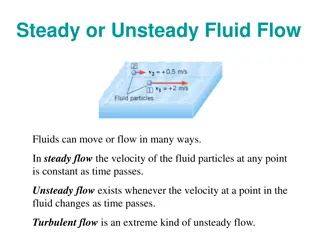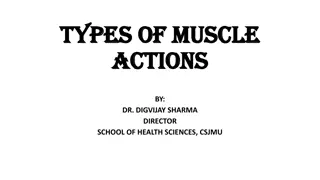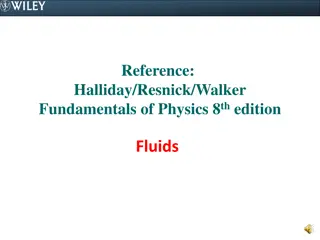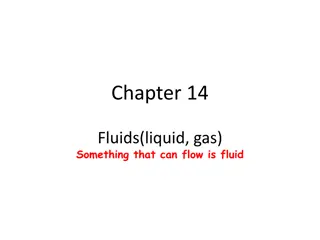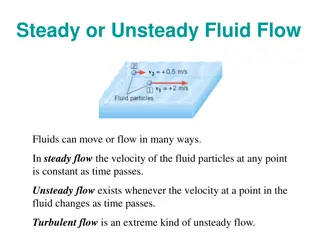Drilling and Completion Fluids Market
Drilling and completion fluid is used in drilling boreholes into the earth. Although drilling fluids and completion fluids vary in their functionalities, they can be used for different purposes in the same operations and the same applications such as oil & gas production and piling of metro pillars.
2 views • 6 slides
Drilling Fluids Market to be Worth $10.7 Billion by 2031
Drilling Fluids Market by Type (Liquid-based [Oil, Water, Synthetic], Pneumatic-based), Product (Weighting Agents, Viscosifiers, Defoamers, Lubricants), Application, End-use (Oil & Gas, Mining, Construction), and Geography - Global Forecast to 2031\n\t
1 views • 5 slides
Fluid Management in ICU: Understanding Body Fluid Compartments and Types of Fluids
Fluid management in the ICU is crucial for patient care. This includes understanding the distribution of body fluid compartments, such as intravascular, interstitial, and intracellular fluids. Different types of fluids like crystalloids and colloids play essential roles in treatment. Crystalloids ar
3 views • 26 slides
1-Drilling Fluids Market Expected to Reach $10.7 Billion by 2031
Meticulous Research\u00ae\u2014a leading global market research company, published a research report titled, \u2018Drilling Fluids Market by Type (Liquid-based [Oil, Water, Synthetic], Pneumatic-based), Product (Weighting Agents, Viscosifiers, Defoamers, Lubricants), Application, End-use (Oil & Gas,
6 views • 4 slides
Understanding Fluid Therapy in Veterinary Medicine
In the nineteenth century, fluid therapy was limited to severely ill patients, but now both veterinary and human medicine utilize intravenous fluid therapy extensively. Dehydration can have serious consequences, and isotonic replacement fluids are essential based on estimated dehydration, maintenanc
1 views • 20 slides
Rising Demand Drives Drilling Fluids Market to $10.7 Billion by 2031
Meticulous Research\u00ae\u2014a leading global market research company, published a research report titled, \n\u2018Drilling Fluids Market by Type (Liquid-based [Oil, Water, Synthetic], Pneumatic-based), Product\n (Weighting Agents, Viscosifiers, Defoamers, Lubricants), Application, \nEnd-use (Oil
0 views • 3 slides
Drilling Fluids Industry Anticipated to Grow to $10.7 Billion by 2031
Meticulous Research\u00ae\u2014a leading global market research company, published a research report titled, \n\u2018Drilling Fluids Market by Type (Liquid-based [Oil, Water, Synthetic], Pneumatic-based), Product \n(Weighting Agents, Viscosifiers, Defoamers, Lubricants), Application, End-use (Oil &
0 views • 4 slides
APAC Immersion Cooling Fluids Market for EVs to Witness Massive Growth Forecast
The Asia-Pacific immersion cooling fluids market for EVs (excluding China) is projected to reach $65.1 million by 2032 from $3.0 million in 2022, growing at a CAGR of 36.0% during the forecast period 2022-2032.\nRead Report Overview: \/\/bisresearch.com\/industry-report\/asia-pacific-immersion-cooli
0 views • 3 slides
Drilling Fluids Sector Projected to Hit $10.7 Billion by 2031
\nMeticulous Research\u00ae\u2014a leading global market research company, published a research report titled, \n\u2018Drilling Fluids Market by Type (Liquid-based [Oil, Water, Synthetic], Pneumatic-based), Product \n(Weighting Agents, Viscosifiers,
0 views • 3 slides
Drilling Fluids Market
In 2022, the global drilling fluids market accounted for USD 9.8 billion. This market is estimated to reach USD 16.1 billion in 2032 at a CAGR of 5.2% between 2023 and 2032. The global drilling fluids industry is a highly dynamic & competitive indust
2 views • 3 slides
Understanding Fluid Properties and Characteristics
A fluid is a substance that deforms continuously under shear stress, with gas and liquid classified as fluids. This article discusses key properties of fluids such as density, specific volume, specific weight, specific gravity, viscosity, pressure, surface tension, and stress. Understanding these ch
1 views • 4 slides
Understanding Fluid Mechanics: Archimedes, Pascal, and Bernoulli
Explore the principles of fluid mechanics including Archimedes' Principle, Pascal's Law, and Bernoulli's Principle. Learn about mass density, buoyant force, and the behavior of floating objects in liquids. Discover how the buoyant force is equal to the weight of displaced fluids, and how it affects
0 views • 22 slides
Understanding Transmission of Infectious Diseases in Epidemiology
Exploring the various modes of transmission of infectious diseases, this content delves into how blood, internal fluids, genital fluids, droplets, coughing, airborne particles, and contact can spread pathogens like HIV, HBV, HCV, and more. It discusses the mechanisms and risks associated with each m
0 views • 21 slides
Understanding Water Potential and Solute Concentration in Biological Systems
Explore the concept of water potential and solute concentration in cells through diagrams and equations. Learn about hypertonic, hypotonic, and isotonic solutions, and how water movement is affected by solute concentration differences. Discover how adding solutes affects water potential and the dire
0 views • 19 slides
Understanding Fluids: A Comprehensive Review
Explore the properties of fluids including their behavior, density, pressure, and forces through a series of questions and explanations. From identifying fluids at room temperature to understanding buoyant forces, this review covers essential concepts in fluid mechanics.
0 views • 21 slides
Drilling Fluids Market Anticipated to Reach $10.7 Billion by 2031
Meticulous Research\u00ae\u2014a leading global market research company, published a research report titled,\n \u2018Drilling Fluids Market by Type (Liquid-based [Oil, Water, Synthetic], Pneumatic-based), Product\n (Weighting Agents, Viscosifiers, De
0 views • 3 slides
Understanding HIV Post-Exposure Prophylaxis (PEP) and Prevention
HIV Post-Exposure Prophylaxis (PEP) is a crucial emergency medical response for individuals exposed to HIV, aiming to prevent infection. It involves a regimen of medications, tests, and counseling services initiated within 72 hours of exposure. HIV transmission occurs through body fluids like blood,
4 views • 27 slides
Adjusting Tonicity and pH in Pharmaceutical Solutions
Methods to adjust the isotonicity of pharmaceutical solutions involve calculations based on colligative properties. This ensures solutions are isotonic to avoid side effects like RBC haemolysis. Class-1 methods include adding NaCl to lower freezing point, while Class-2 methods involve adjusting with
1 views • 8 slides
Understanding Intravenous Infusions and Injections in Healthcare
Intravenous infusions and injections play crucial roles in healthcare by delivering drugs and fluids directly into the body. Injections can be administered in various ways, including intravenous, intramuscular, and subcutaneous routes. Intravenous infusions provide fluids, electrolytes, and medicati
4 views • 20 slides
Introduction to Properties of Fluids in Hydraulic Systems
Fluids, including liquids and gases, exhibit continuous deformation when subjected to shear forces. Understanding fundamental properties like density, specific weight, and specific volume is crucial for applying fluid mechanics principles to solve practical problems in fluid power systems. This chap
0 views • 34 slides
Understanding Fluid Flows in Fluid Mechanics
Fluid Mechanics is the study of fluids in motion or at rest, and their interactions with solids or other fluids. Fluid flows are classified based on various characteristics such as viscous versus inviscid regions, internal versus external flow, compressible versus incompressible flow, laminar versus
1 views • 16 slides
Root Operations in ICD-10-PCS for Body Part Procedures
An overview of root operations in ICD-10-PCS related to taking out solids, fluids, or gases from a body part, including Drainage, Extirpation, and Fragmentation. Each root operation has specific definitions, examples, and explanations for procedures involving removal or manipulation of solid matter
0 views • 60 slides
Understanding Parenteral Fluid Therapy and IV Solutions
This informative content explores the essentials of parental fluids therapy, including the indications, types of IV solutions (isotonic, hypotonic, hypertonic), and categories of intravenous solutions based on their purpose. It covers the significance of IV solutions containing dextrose or electroly
0 views • 37 slides
Understanding Particle Motion in Fluids: Dynamics and Phenomena
Exploring the intricate dynamics of particle motion within fluids, this content delves into mechanical micro-processes, particle velocity, terminal velocity, flow regimes, and the calculation of drag coefficients. It covers the Stokes region, laminar flow conditions, and considerations for transient
0 views • 28 slides
Understanding Major Intra and Extracellular Electrolytes in Body Fluids
Body fluids contain various electrolytes crucial for maintaining cell and tissue environments. Electrolyte balance is essential for overall health, and external electrolyte replacement therapy may be necessary in certain conditions. The body's fluid compartments - intracellular, interstitial, and pl
0 views • 10 slides
Understanding Fluid Therapy in Animals: Basics and Indications
Explore the fundamental concepts of body fluids in animals, including their composition, types, routes of administration, and signs of fluid overload. Delve into the balance of intracellular and extracellular fluids, daily water intake and loss, and the role of electrolytes. Dr. Bipin Kumar provides
0 views • 33 slides
Understanding Renal Regulation of Body Fluids
Renal regulation of body fluids involves mechanisms like water diuresis and osmotic diuresis to maintain fluid balance in the body. The secretion of Anti-Diuretic Hormone (ADH) plays a crucial role in controlling water retention. ADH release is influenced by factors like blood volume, blood pressure
0 views • 18 slides
Drilling Fluids Industry Poised to Top $10.7 Billion by 2031
Meticulous Research\u00ae\u2014a leading global market research company, published a research report titled, \u2018Drilling Fluids Market by Type (Liquid-based [Oil, Water, Synthetic], Pneumatic-based), Product (Weighting Agents, Viscosifiers, Defoam
0 views • 3 slides
Understanding Working Fluids in Thermodynamic Systems
Working fluids are essential in thermodynamic systems to transfer energy and perform work. This article explores the selection criteria, types, and work calculation involving working fluids in cogeneration and trigeneration systems. The properties, fluid types, and work processes are discussed to un
1 views • 14 slides
Understanding Hydraulic Turbines in Fluid Mechanics and Machinery
Fluid mechanics and machinery involve the study of hydraulic turbines, which are devices that extract energy from flowing fluids. Turbines can convert the energy from pressure and velocity in fluids into mechanical energy, with different types such as steam turbines, gas turbines, and water (hydraul
0 views • 17 slides
Investigating Immiscible Fluids: Layers Formation and Interface Motion
The report explores the formation of layers in a beaker containing immiscible fluids such as water and vegetable oil. It delves into the theoretical and experimental aspects, discussing the chemical properties, layer creation limits, interface motion upon disturbance, and the strengths and weaknesse
2 views • 6 slides
Understanding Osmosis and Cell Membrane Transport
Osmosis is the process of water molecules diffusing across a semi-permeable membrane, crucial for maintaining cell function. It involves the movement of water from areas of high concentration to low concentration until equilibrium is reached. Special proteins called aquaporins facilitate water trans
1 views • 24 slides
Fundamentals of Fluid Flow: Steady, Unsteady, Compressible, Incompressible, Viscous, Nonviscous
Fluid flow characteristics such as steady vs. unsteady, compressible vs. incompressible, and viscous vs. nonviscous play crucial roles in understanding how fluids behave in various scenarios. Steady flow entails constant velocities over time, while unsteady flow involves changing velocities. Liquids
0 views • 11 slides
Understanding Types of Muscle Actions in Physiology
Explore different types of muscle actions, including isometric contractions, isotonic contractions, concentric contractions, eccentric contractions, isokinetic contractions, and iso-inertial contractions. Each type plays a crucial role in muscle function and movement, with varying effects on muscle
0 views • 14 slides
Understanding Fluid Bolus in Anesthesia Management
Anesthesia providers often face challenges like hypotension during procedures. In such cases, increasing fluids can help expand blood volume temporarily. However, it is crucial to calculate the amount of fluid accurately to prevent complications like albumin washout, which can lead to further issues
0 views • 14 slides
Understanding Fluids in Physics
Fluids play a crucial role in physics, encompassing both liquids and gases. Learn about the properties of fluids, such as density and pressure, through practical examples and questions from renowned physics textbooks.
0 views • 32 slides
Understanding Fluids: Density, Specific Gravity, and Pressure in Liquids and Gases
Fluids such as liquids and gases possess properties like density, specific gravity, and pressure that play a crucial role in their behavior. Density measures the heaviness of a material, while specific gravity compares the mass of a material to that of water. Pressure affects the density of fluids,
0 views • 55 slides
Pediatric CRRT Prescription: Rates, Dose, Fluids Overview
This informative content by Dr. Michael Zappitelli from Montreal Children's Hospital discusses the prescription rates, doses, and fluids involved in Pediatric CRRT. It covers insights on blood flow rates, diverse solutions used, and ideal compositions for Peritoneal dialysis fluid. The article empha
0 views • 20 slides
Importance of Weight Training for Physical Fitness
Weight training, a fundamental method for enhancing strength and overall physical fitness, involves various exercises like isotonic, isometric, and isokinetic movements utilizing equipment such as barbells, dumbbells, and machines. Incorporating a variety of exercises targeting different muscle grou
0 views • 11 slides
Understanding Fluid Flow: Steady vs. Unsteady, Compressible vs. Incompressible, Viscous vs. Nonviscous
Fluid flow can be categorized into different types such as steady or unsteady, compressible or incompressible, and viscous or nonviscous. Steady flow maintains constant velocity over time, while unsteady flow involves changing velocities. Liquids are typically incompressible, whereas gases can be co
0 views • 12 slides



